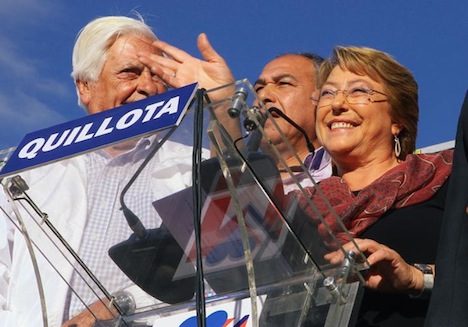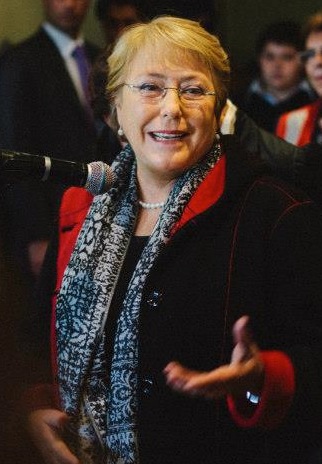Michelle Bachelet is almost certain to set a new precedent in post-Pinochet Chilean politics when she wins a second (non-consecutive) term as president, returning to the office she held between 2006 and 2010. ![]()
But it’s an open question as to whether Bachelet (pictured above) will do so with a first-round victory — meaning that Bachelet will need to win at least 50% of the vote on Sunday, November 17 in order to avoid a runoff later in December.
Bachelet’s victory would return the broad center-left Concertación de Partidos por la Democracia (Concert of Parties for Democracy) to La Moneda, Chile’s presidential palace after the center-right presidency of businessman Sebastián Piñera, the first non-Concertación president in Chile’s post-Pinochet era, which began with the October 1988 referendum in which Chilean voters opposed extending the reign of Augusto Pinochet’s on
Some polls show Bachelet tantalizingly close to achieving enough support for a first-round victory. An Opina Research poll published by El Comercio earlier this week shows Bachelet with 46%, to just 22% for Evelyn Matthei, the candidate of Chile’s center-right coalition, the Coalición por el Cambio (Coalition for Change), but widely known as the Alianza por Chile (Alliance for Chile). A Centro de Estudios Públicos poll from last week shows Bachelet with 47% and Matthei with just 14%.
But an even more recent IPSOS survey conducted between October 19 and November 5 shows that Bachelet is very likely to head to a runoff — even after stripping out undecided voters, Bachelet won just 35% and Matthei won 22%.
Bachelet’s problem is that Matthei doesn’t represent her sole competition. Two third-party candidates routinely poll between 10% and 15% in surveys, and they could shake up Sunday’s race if Bachelet’s supporters remain complacent and center-right voters remain unenthusiastic about Matthei.
The first is Marco Enríquez-Ominami (popularly known as ‘MEO’), who burst onto the Chilean political scene in 2009 when he left the Partido Socialista de Chile (PS, Socialist Party of Chile) to run for president as an independent. MEO ultimately won 20% of the vote, falling behind both Piñera and the runner-up, former president Eduardo Frei Ruiz-Tagle. Enríquez-Ominami founded the Partido Progresista (Progressive Party) in 2010, and he’s running again for president on a stridently leftist platform that openly embraces the communist legacy of former Chilean president Salvador Allende, who died in the 1973 coup that brought Augusto Pinochet to power. The events of both the Allende presidency and the Pinochet regime continue to loom heavily over Chilean politics.
But another independent candidate has stolen some thunder from both MEO and Matthei. Franco Parisi, a popular economist and business professor, and a a former councillor of Chile’s copper commission between 2010 and 2012, is running as a centrist candidate in the presidential elections. Matthei has launched a negative onslaught against Parisi over the past few weeks, accusing him of owing $200,000 in back wages to employees, and though her negative attacks have reversed some of Parisi’s gains, he’s still polling in the mid-teens.
A third candidate, Marcel Claude, a former official in Chile’s central bank and an environmental activist, is running as an independent with the endorsement of Chile’s small Humanist Party.
In the most recent IPSOS poll, 15% of voters supported Parisi, 12% supported Enríquez-Ominami, 7% supported Claude and 5% supported other small candidates — taken together, that means that 39% of Chileans support a third candidate in 2013, even more than support Bachelet. Moreover, depressed turnout for Mathei’s candidacy could conceivably launch either Parisi or Enríquez-Ominami into a runoff with Bachelet — it would be the first such presidential runoff that didn’t feature a race between the mainstream center-left Concertación and the mainstream center-right Alianza. Continue reading Can Bachelet win a first-round victory in Chile’s presidential election?


